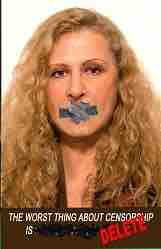Freedom of Speech
Freedom of speech in the United States is protected by the First Amendment to the United States Constitution and by many state constitutions as well.

Protesting for Freedom of Speech
This individual is protesting for the right to speak freely. Freedom of speech is a closely guarded liberty in American society.
The freedom of speech is not absolute. The Supreme Court of the United States has recognized several categories of speech that are excluded, and it has recognized that governments may enact reasonable time, place, or manner restrictions on speech.
Criticism of the government and advocacy of unpopular ideas that people may find distasteful or against public policy are almost always permitted. There are exceptions to these general protections. Within these limited areas, other limitations on free speech balance rights to free speech and other rights, such as rights for authors and inventors over their works and discoveries (copyright and patent), protection from imminent or potential violence against particular persons (restrictions on fighting words), or the use of untruths to harm others (slander). Distinctions are often made between speech and other acts which may have symbolic significance.
Despite the exceptions, the legal protections of the First Amendment are some of the broadest of any industrialized nation, and remain a critical, and occasionally controversial, component of American jurisprudence.
Incorporation of Freedom of Speech
Although the text of the Amendment prohibits only the United States Congress from enacting laws that abridge the freedom of speech, the Supreme Court used the incorporation doctrine in Gitlow v. New York (1925) to also prohibit state legislatures from enacting such laws.
Protected Speech
The following types of speech are protected:
- Core political speech. Political speech is the most highly guarded form of speech because of its purely expressive nature and importance to a functional republic. Restrictions placed upon core political speech must weather strict scrutiny analysis or they will be struck down.
- Commercial speech. Not wholly outside the protection of the First Amendment is speech motivated by profit, or commercial speech. Such speech still has expressive value although it is being uttered in a marketplace ordinarily regulated by the state.
- Expressive speech. The Supreme Court has recently taken the view that freedom of expression by non-speech means is also protected under the First Amendment. In 1968 (United States v. O'Brien) the Supreme Court stated that regulating non-speech can justify limitations on speech.
Type of Free Speech Restrictions
The Supreme Court has recognized several different types of laws that restrict speech, and subjects each type of law to a different level of scrutiny.
- Content-based restrictions. Restrictions that require examining the content of speech to be applied must pass strict scrutiny. Restrictions that apply to certain viewpoints but not others face the highest level of scrutiny, and are usually overturned, unless they fall into one of the court's special exceptions.
- Time, place, or manner restrictions. Time, place, or manner restrictions must withstand intermediate scrutiny. Note that any regulations that would force speakers to change how or what they say do not fall into this category (so the government cannot restrict one medium even if it leaves open another).
- Prior restraint. If the government tries to restrain speech before it is spoken, as opposed to punishing it afterwards, it must: clearly define what's illegal, cover the minimum speech necessary, make a quick decision, be backed up by a court, bear the burden of suing and proving the speech is illegal, and show that allowing the speech would "surely result in direct, immediate and irreparable damage to our Nation and its people. "
Exceptions to Free Speech
Certain exceptions to free speech exist, usually when it can be justified that restricting free speech is necessary to protect others from harm. These restrictions are controversial, and have often been litigated at all levels of the United States judiciary. These restrictions can include include the incitement to crime (such as falsely yelling "Fire! " in a crowded movie theater); fighting words (which are words that are likely to induce the listener to get in a fight); true threats; obscenity; child pornography; defamation; invasion of privacy; intentional infliction of emotional distress; or certain kinds of commercial, government, or student speech. Speech related to national security, military secrets, inventions, nuclear secrets or weapons may also be restricted.
The flag of the United States is sometimes symbolically burned, often in protest of the policies of the American government, both within the country and abroad. The United States Supreme Court in Texas v. Johnson, 491 U.S. 397 (1989), and reaffirmed in U.S. v. Eichman, 496 U.S. 310 (1990), has ruled that due to the First Amendment to the United States Constitution, it is unconstitutional for a government (whether federal, state, or municipality) to prohibit the desecration of a flag, due to its status as "symbolic speech. " However, content-neutral restrictions may still be imposed to regulate the time, place, and manner of such expression.

Free Speech Zones
The government may set up time, place, or manner restrictions to free speech. This image is a picture of the free speech zone of the 2004 Democratic National Convention.